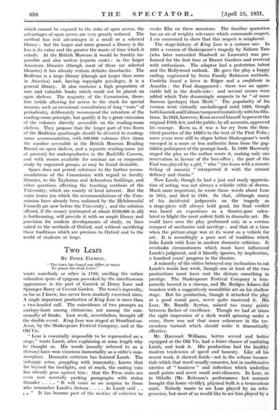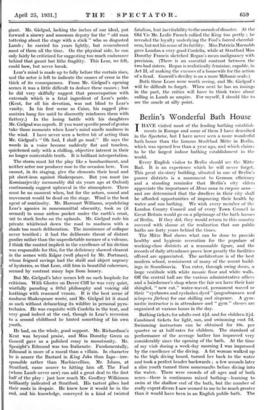Two Lears
BY PETER FLEMING.
" The town has found out different ways To praise the rival Lears."
wrote somebody or other in 1756, swelling the rather colourless spate of epigram provoked by the simultaneous appearance in the part of Garrick at Drury Lane and Spranger Barry at Covent Garden. The town's ingenuity, so far as I know, has never been similarly exercised since. A single important production of King Lear is rarer than a two-headed calf. The coincidence of two prompts an analogy-hunt among chimaeras, not among the com- monalty of freaks. Last week, nevertheless, brought off the double event. King Lear was staged at Stratford-on- Avon, by the Shakespeare Festival Company, and at the Old Vic.
" Lear is essentially impossible to be represented on a stage," wrote Lamb, after explaining at some length why he thought so. His words (usually referred to as a dictum) have won vicarious immortality as a critic's com- monplace. Dramatic criticism has lionized Lamb. The unhappy actor, grappling with immensity, knows that far beyond the footlights, out of reach, the casting vote has already gone against him : that the Press seats are even now mentally packing paragraphs with stolen thunder . . . . " It will come as no surprise to those who remember Lamb's dictum . . . . As Lamb said . . 0 " It has become part of the routine of criticism to evoke Elia on these occasions. The familiar quotation has an air of weighty relevance which commands respect. I am concerned to show that this respect is misplaced.
The stage-history of King Lear is a curious one. In 1681 a version of Shakespeare's tragedy by Nahum Tate (who later succeeded Shadwell as Laureate) was per- formed for the first time at Dorset Gardens and received with enthusiasm. The adaptor had a pedestrian talent and the Hollywood outlook. He gave the play a happy ending, engineered by Swiss Family Robinson methods. Cordelia found a lover in Edgar and a confidante in Aranthe : the Fool disappeared : there was an appre- ciable fall in the death-rate : and several scenes were added which Tate disarmingly suspects to be " of more Success (perhaps) than Merit." The popularity of his version went virtually unchallenged until 1823, though both Garrick and Colman tampered tentatively with his dilu- tions. In 1823, however, Kean nerved himself to present the original Fifth Act, and the public, by all accounts, approved his courage. Even so, it was a far cry from the thea- trical practice of the 1820's to the text of the First Folio ; some years were still to elapse before Shakespeare's work emerged in a more or less authentic form from the gag- ridden palimpsest of the prompt-book. In 1838 Macready staged the play as the author wrote it, making only one reservation in favour of the box-office ; the part of the Fool was played by a girl, " who " (we learn with a remote feeling of nausea) " interpreted it with the utmost delicacy and charm."
Now Lamb, though he had a just and ready apprecia- tion of acting, was not always a reliable critic of drama. Much more important, he wrote those words about Lear in 1811, and died in 1834. So that, although many of his incidental judgments on the tragedy as a stage-piece will always hold good, his final verdict was based on experience as a theatre-goer calcu- lated to blight the most ardent faith in dramatic art. He could have seen the play performed only in a version compact of saccharine and sacrilege : and that at a time when the picture-stage was at its worst as a vehicle for art. It is accordingly a poor sort of tradition which links Lamb with Lear in modern dramatic criticism. It overlooks circumstances which must have influenced Lamb's judgment, and it blandly ignores, by implication, a hundred years' progress in the theatre.
A minority of the critics betrayed any inclination to eat Lamb's words last week, though one at least of the two productions must have cost the dictum something in prestige. The Shakespeare Festival Company is tem- porarily housed in a cinema, and Mr. Bridges. Adams did wonders with a suggestively monolithic set on his shallow stage. But his production, though it attacked the play at a good round pace, never quite mastered it. His Lear, Mr. Randle Ayrton, missed too many points between flashes of excellence. Though we had at times the right impression of a dark world spinning under a curse, there was not that inner coherence in the tre- mendous turmoil which should make it dramatically effective.
Mr. Harcourt Williams, better served and better equipped at the Old Vic, had a fairer chance of confuting Lamb, and took it. His production had the healthy Modern tendencies of speed and honesty. Like all his recent work, it showed finish—not in the urbane inessen- tials which that word usually connotes, but in unobtrusive niceties of " business " and inflection which underline small points and avert small anti-climaxes. In Lear, as in Othello (Mr. Robeson's performance last summer brought this home vividly), phySical bulk is a tremendous asset. Nobody wants to see Lear played by an octo- genarian, but most of us would like to 'see him played by a giant. Mr. Gielgud, lacking the inches of our ideal, put forward a sinewy and sonorous deputy for the " old man tottering about the stage with a stick " who so disgusted Lamb ; he carried his years lightly, but remembered most of them all the time. On the physical side, he can only fairly be criticized for suggesting too much endurance behind that gaunt but lithe fragility. This Lear, we felt, could bow, but never break.
Lear's mind is made up to folly before the curtain rises, and the actor is left to indicate the causes of error in the thick of its consequences. From Mr. Gielgud's opening scenes it was a little difficult to deduce these causes ; but he did very skilfully suggest that preoccupation with externals which is a fatal ingredient of Lear's pride. (Kent, for all his devotion, was not blind to Lear's vanity. In his first scene as Caius, his rugged plea- santries hang fire until he discreetly reinforces them with flattery.) In the losing battle with his daughters Mr. Gielgud was superb. If you want specific proof of genius take those moments when Lear's mind smells madness in the wind. I have never seen a better- bit of acting than Mr. Gielgud's" " Oh foo-1, I shall go mad." He says the words in a voice become suddenly flat and toneless, quickened only with a chilling, objective interest in their no longer contestable truth. It is brilliant interpretation.
The storm must hit the play like a bombardment, and neither actor nor producer rose to the occasion here. You cannot, in its staging, give the elements their head and pit sheet-iron against Shakespeare. But you must (as Komisarjevsky memorably did six years ago at Oxford) continuously suggest upheaval in the atmosphere. There must be no moment when, but for the actors, sound and movement would be dead on the stage. Wind is the best agent of continuity. Mr. Harcourt Williams, sepulchring Lear's agonies in noncommittal obscurity, took us (it seemed) to some airless pocket under the earth's crust, 'bt to stark limbo on the uplands. Mr. Gielgud rode his private whirlwind down• the road to madness with a shade too much deliberation. The imminence of collapse never terrified ; it had the deliberate threat of distant gunfire rather than the unpredictable menace of a volcano.. I think the control implicit in the excellence of his diction was responsible for this; for the deficiency showed clearest in the scenes with Edgar (well played by Mr. Portman), whose feigned ravings. had the shrill and abject urgency of hysterics, so that Lear, -still firm in beautiful coherence; seemed by contrast many laps from lunacy.
But Mr. p such n Gielgud"s-later scenes left no uh loOhole for _ • • criticism. With Gloster on Dover Cliff he` as very quiet, wistfully parading a • fitful. philosophy and voicing old loathings with reasoned venbin. It is the best scene of madness Shakespeare wrote; acid' Mr. let it stand as such without debauching its ivildfire in perSonal pyroL technics.' He was exquisite with (Ordelia in the tbilt, and very good indeed at the end, thmigh in Lear's reversion to a second childhood he hinted something of his own youth.
He had, on the whole, good support. Mr. Richardion'S Kent was beyond praise, and Miss Dorothy Green as Goneril gave us a polished essay in monstrosity. Mr. Speaight's Edmund was too Italianate. Fundarnentally, Edmund is more of a rascal than a villain. In character he is nearer the Bastard in King John than Iago—irre- sponsible rather than Machiavellian. Mr. Isham, at Stratford, came nearer to hitting him off. The Fool (whom Lamb never saw) can add a great deal to the first half of the play : just how much Mr. Geoffrey Wilkinson brilliantly indicated at Stratford. His tartest gibes had their roots in despair. He knew how it would be in the end, and his knowledge, conveyed in a kind of twisted fatalism, lent inevitability to the onrush of disaster. At the Old Vic Mr. Leslie French rallied the King too pertly ; he revealed the loyalty underlying the Fool's forced cheerful- ness, but not his sense of its futility. Miss Patricia Macnabb gave London a very good Cordelia, while at Stratford Miss Dorothy Francis sketched Regan's mean malignancy with precision. (There is an essential contrast between the two bad sisters. Regan is realistically feminine, capable, in Act II, of making the excuses of a housewife for the action of a fiend. Goneril's devilry is on a more Miltonic scale.) Both these Lears were worth seeing, and Mr. Gielgud's will be difficult to forget. When next he has an innings in the part, the critics will have to think twice about calling in Lamb as umpire. For myself, I should like to see the oracle at silly point.







































 Previous page
Previous page